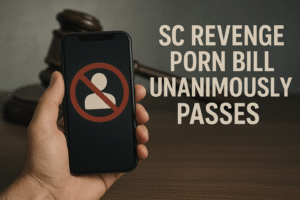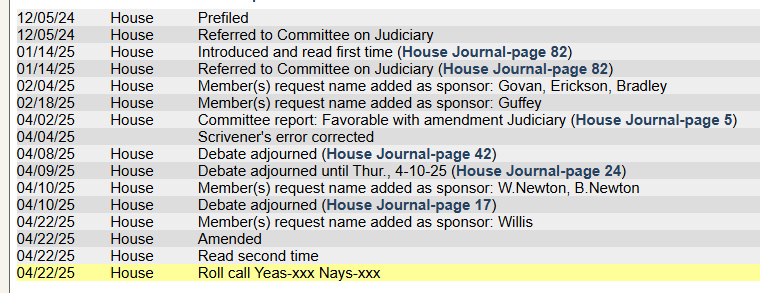 The South Carolina House just unanimously passed House Bill 3058 (aka the ‘Revenge Porn Bill’), which would make the nonconsensual sharing of intimate images a crime for the first time in state history.
The South Carolina House just unanimously passed House Bill 3058 (aka the ‘Revenge Porn Bill’), which would make the nonconsensual sharing of intimate images a crime for the first time in state history.
Currently, South Carolina is the only U.S. state without specific laws criminalizing ‘revenge porn’. The new legislation seeks to change that, following growing concerns from lawmakers and experts who say the behavior is more widespread than publicly recognized.
Pre-filed by Rep Chris Wooten on 12/5/24, HB 3058 introduces criminal penalties for distributing intimate images without the subject’s consent.

HB 3058 specifically reads:
To whom was referred a Bill (H. 3058) to amend the South Carolina Code of Laws by adding Section 16-15-330 so as to define necessary terms for the offense of intentionally disseminating intimate images, etc., respectfully
Report:
That they have duly and carefully considered the same, and recommend that the same do pass with amendment:
Amend the bill, as and if amended, SECTION 2, by striking Section 16-15-332(A), (B), and (C) and inserting:
(A) A person who intentionally disseminates an intimate image or a digitally forged intimate image of another person without the effective consent of the depicted person is guilty of the unauthorized disclosure of intimate images. A person intentionally disseminates an intimate image or a digitally forged intimate image if he has knowledge that the image was obtained or created under circumstances when he knew or reasonably should have known the person depicted had a reasonable expectation of privacy. Any dissemination of multiple intimate images of the same individual as part of a common act is a single offense. The fact that the identifiable individual:
(1) provided affirmative consent for the creation of the intimate image shall not establish that the individual provided effective consent for the dissemination of the intimate image; and
(2) disclosed the intimate image to another individual shall not establish that the identifiable individual provided effective consent for the dissemination of the intimate image by the person alleged to have violated this section.
(B) A person who violates the provisions of this section, with the intent to cause physical, mental, economic, or reputational harm to the individual portrayed in the image, or for the purpose of profit or pecuniary gain, is guilty of a felony and, upon conviction, for a:
(1) first offense, must be fined not more than five thousand dollars or imprisoned not more than five years, or both; or
(2) second or subsequent offense, after an intervening adjudication for a previous violation of the provisions of this section, must be fined not more than ten thousand dollars or imprisoned not less than one year but not more than ten years, or both. No part of the minimum sentence may be suspended nor probation granted.
(C) Dissemination of multiple intimate images or digitally forged intimate images of the same individual may be considered separate and distinct offenses. A person who violates the provisions of this section, without the intent to cause physical, mental, economic, or reputational harm to the individual portrayed in the image, or for the purpose of profit or pecuniary gain, for a:
(1) first offense, is guilty of a misdemeanor and, upon conviction, must be fined not more than five thousand dollars or imprisoned not more than one year, or both; or
(2) second or subsequent offense, after an intervening adjudication for a previous violation of the provisions of this section, is guilty of a felony and, upon conviction, must be fined not more than five thousand dollars or imprisoned not more than five years, or both.
If passed into law, the bill would impose escalating penalties based on intent. Individuals who distribute images with harmful or financial motivations could face years in prison.
The legislation now moves to the South Carolina Senate for consideration. If approved there, it will head to Governor Henry McMaster to either veto it or sign it into law.

